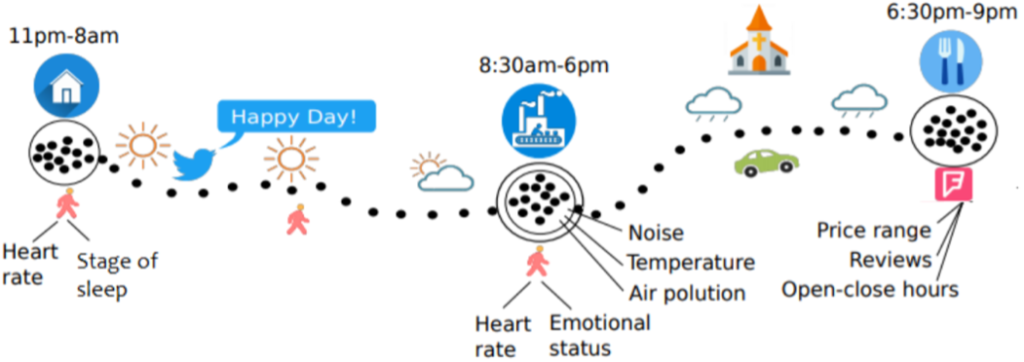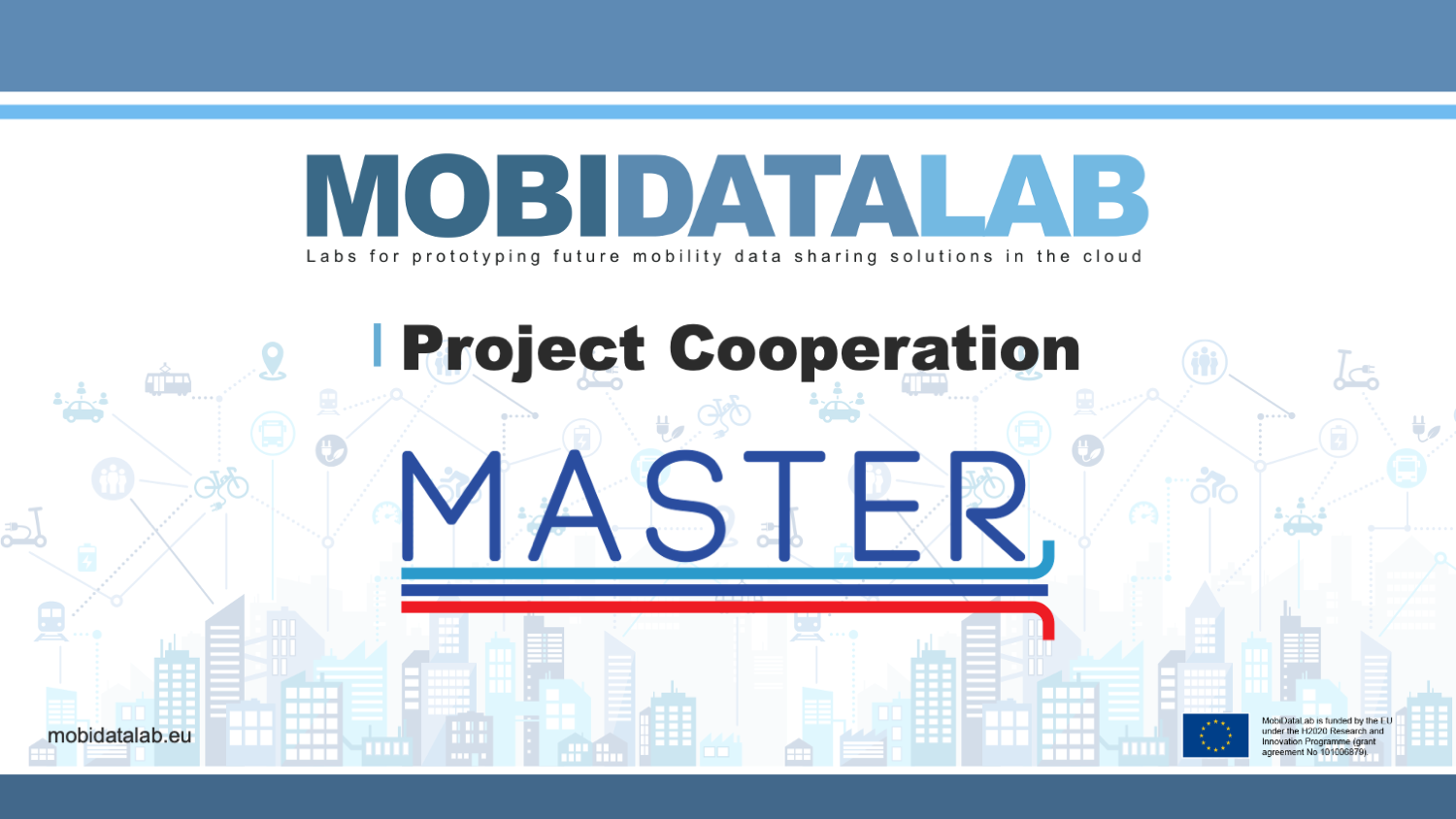MASTER (Multiple ASpects TrajEctoRy management and analysis) is a project funded by the European Commission through the Marie Curie call H2020-MSCA-RISE-2017. The overarching objective of MASTER is to form an international and inter-sectoral network of organisations working on a joint research programme to define new methods to build, manage and analyse multiple aspects of semantic trajectories. The RISE schema is based on the research carried out during secondments of staff from European academic institutions to non-academic or international academic institutions.
MASTER Project Partners
The consortium includes ten partners: five academic partners from Europe (National Research Council of Italy, University Ca’ Foscari Venice, University of Piraeus Research Center, University of Paris Saint-Quentin-en-Yvelines, Harokopio University); one partner is a European non-academic (Municipality of Thira); four partners are academic international of which one is from Canada (Dalhousie University) and three are from Brazil (Federal University of Santa Catarina, Federal University of Ceará).
MASTER Project Objectives and Methodology
Text by: Chiara Renso (Project Coordinator) & Beatrice Rapisarda (Communication Manager)
We propose methods to analyze and infer knowledge from holistic trajectories, considering as vital issues the privacy and big data dimensions. We are driven by potential market opportunities benefitting the European society in the field of tourism, sea monitoring and public transportation.
The multi-aspect trajectory, or holistic trajectory, is a form of data where the space-time path followed by a moving object (people, animals, vehicles) is enriched with semantic information related to the context. An example of a multi-aspect trajectory is represented in the figure where we have the sequence of space-time positions of a person with the indication of numerous context information such as heartbeat and sleep detected by a smartwatch, a post on social media, the time weather, stopping place, air pollution or means of transport used.

Why is it important to have methods to manage and analyze these trajectories?
This data is created by the numerous tracking and sensing tools widely used today. It is essential to understand (1) how to be able to extract relevant mobility information, (2) which data sources can be used to semantical enrich them and (3) how to combine them in a synergic way. Clearly, as we add semantics to movement data, we are also exposing the tracked moving object to additional privacy breaches and non-ethical use of such knowledge.
The enrichment process must respect the privacy of individuals who can be exposed to sensitive data breaches and unwanted inferences. In addition, the analysis of these data must respect the ethical use of the results.
In the MASTER Project, we focus on developing analysis methods so that we balance the usefulness of the analysis but, at the same time, we are also respectful of privacy and ethics.
MASTER Project Models
We developed a conceptual model for Multiple Aspects Trajectories [1] that can be exploited in database representations of such data and can drive the data representation in different applications. Based on this model, we are developing a tool called MAT-builder to create multiple aspects trajectories from different data sources [2].
We studied also similarity methods [3] and index for efficient comparison of the different aspects in similarity computation of trajectories [4]. Analysis techniques include, for example, trajectory predictions [5,6] and network abstractions [7].
The application fields where these analyses can significantly contribute are very diverse: from green transport (improving traffic and transport management) to health (epidemiological studies), to tourism (supporting sustainable tourism), but also in the maritime field (optimizing routes of ships for less environmental impact) or ethological (studying the movement of animals).
MASTER Project Focus Areas
In the MASTER Project, we focus specifically on the tourism, transport and maritime fields.
In the tourism field, we collaborate with our partner Municipality of Thira in Santorini (Greece) to study their tourism data and see how we can help in better understanding the tourists’ behaviour and how to face the overtourism phenomenon thanks to data analysis.
In the transport sector, we collaborate with our partner Pontificial Catholic University of Rio de Janeiro in Brazil (who in turn has access to Rio transport data) to study possible methods to face the many issues in transportation in Rio de Janeiro. In addition, our partner University Ca’ Foscari in Venice collaborates with ACTV, the local transport company which manages all sea and ground transportation in the Venice area. In the maritime sector, our partner Dalhousie University (Canada) has ongoing research activity and data access to vessel AIS signals – automatic identification system – at the global level. Among the most recent results in the latter area, we report a joint study by the Ca’ Foscari University of Venice with the Dalhousie University where the movement data of fishing vessels in the Adriatic are studied, semantically enriched with the reports of fish capture and environmental data to predict Catch Per Unit Effort (CPUE), an indicator for the resources exploitation and better fish management [8].
MobiDataLab and MASTER Project Collaboration Points
MASTER and MobiDataLab share many objectives: first of all, the focus on semantic enrichment. In MASTER it is intended as a very general link of raw trajectory data with different forms of contextual information. In MobiDataLab, this concept is instantiated into the Linked Open Data / RDF data representation settings, therefore the methods developed in MASTER can be tailored to fit the MobiDataLab Linked Open Data use case.
Secondly, both MASTER and MobiDataLab have a specific focus on the privacy aspect of mobility data and a general awareness that the more data is enriched with additional sources, the more the privacy of tracked individuals is at risk. We plan collaboration between MASTER and MobiDataLab also in this respect. From privacy to ethics is a further step we have done in MASTER since the project has appointed an Independent Ethical Advisor, Prof. Bettina Berendt, who is assisting the consortium in reflecting on the ethical issues of analysis in semantically enriched mobility data. With the leadership of Prof. Berendt, MASTER partners Chiara Renso (CNR) and Prof. Stan Matwin (Dalhousie University) co-organized a Dagstuhl seminar Mobility Data Analysis: from Technical to Ethical, held January 8 to 12 2022. The MobiDataLab coordinator Thierry Chevallier (AKKA) kindly accepted to participate in the seminar to give the MobiDataLab contribution to the seminar and therefore strengthen the link between the two projects also in this aspect.
Recently, MASTER was organizing a workshop on May 13, 2022, in Venice where Thierry Chevallier (AKKA) participate as a representative of MobiDataLab and exchanged results and open problems that can foster new future collaborations.
More information about the MASTER Project can be found on their project website: master-project-h2020.eu
References:
[1] Ronaldo dos Santos Mello, Vania Bogorny, Luis Otavio Alvares, Luiz H. Z. Santana, Carlos Andres Ferrero, Angelo Augusto Frozza, Geomar Andre Schreiner, Chiara Renso. MASTER: A Multiple Aspect View on Trajectories. Transactions in GIS. First published: 09 May 2019 https://doi.org/10.1111/tgis.12526
[2] Chiara Pugliese, Francesco Lettich, Chiara Renso, Fabio Pinelli. MAT-Builder: a System to Build Semantically Enriched Trajectories. The 23rd IEEE International Conference on Mobile Data Management, 2022.
[3] Lucas May Petry, Carlos Andres Ferrero, Luis Otavio Alvares, Chiara Renso, Vania Bogorny. Towards semantic‐aware multiple‐aspect trajectory similarity measuring. Transactions in GIS, https://doi.org/10.1111/tgis.1254
[4] Ana Paula Ramos de Souza, Chiara Renso, Raffaele Perego, Vania Bogorny; MAT-Index: An index for fast multiple aspect trajectory similarity measuring
Transactions in GIS First published: Januar 2022, https://doi.org/10.1111/tgis.12889
[5] Livia Almada Cruz, Karine Zeitouni and José A. F. de Macedo. Trajectory Prediction from External Sensor Data using Recurrent Neural Networks, International Conference on Big Data and Cyber-Security Intelligence (BDCSIntell), December 13-15, 2018, Beirut, Lebanon.
[6] Petros Petrou, Panagiotis Tampakis, Harris Georgiou, Nikos Pelekis and Yannis Theodoridis Online long-term trajectory prediction based on mined route patterns First International workshop on Multiple Aspects Management and Analysis MASTER 2019 @ ECML-PKDD, Wurzburg, Germany September 16 2019
[7] Ioannis Kontopoulos, Iraklis Varlamis and Konstantinos Tserpes, Uncovering hidden concepts from AIS data: A network abstraction of maritime traffic for anomaly detection. First International workshop on Multiple Aspects Management and Analysis MASTER 2019 @ ECML-PKDD, Wurzburg, Germany September 16 2019
[8] Bruno Brandoli, Alessandra Raffaetà, Marta Simeoni, Pedram Adibi, Fateha Khanam Bappee, Fabio Pranovi, Giulia Rovinelli, Elisabetta Russo, Claudio Silvestri, Amilcar Soares, Stan Matwin. From multiple aspect trajectories to predictive analysis: a case study on fishing vessels in the Northern Adriatic sea. GeoInformatica



